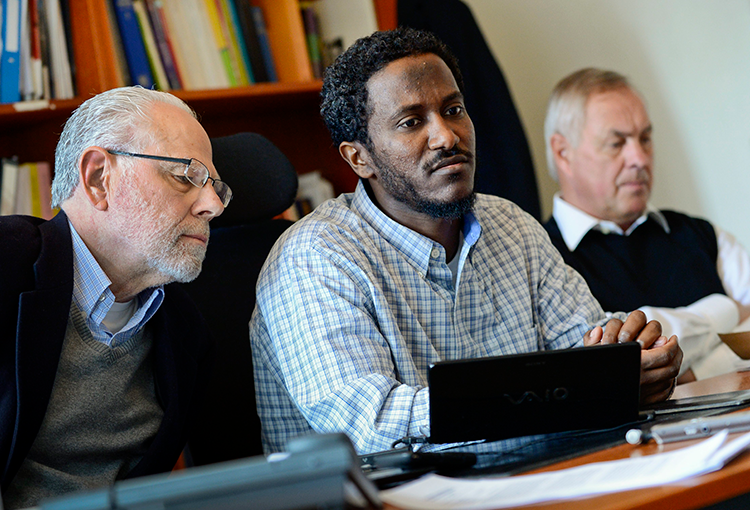Man who claimed US wanted him to spy on mosque can pursue suit over 6-year no-fly-list status, SCOTUS says

Yonas Fikre of Portland, Oregon, center, has been fighting over his placement on the no-fly list since 2010. In this 2012 file photo, he is flanked by his attorneys in Sweden. (Photo by Claudio Bresciani/The Associated Press)
An Oregon man’s challenge to his placement on the no-fly list did not become moot after the government lifted the ban on flying, the U.S. Supreme Court ruled Tuesday in a unanimous opinion.
The high court ruled for Yonas Fikre of Portland, Oregon, who was placed on the list in 2010 and then removed in 2016 after he filed a federal lawsuit. The government had assured Fikre that he would not be placed on the list in the future “based on the currently available information.”
Fikre can continue his suit alleging that he was placed on the list for impermissible reasons, Justice Neil Gorsuch wrote in the opinion for the Supreme Court.
“Put simply,” Gorsuch wrote, “the government’s sparse declaration falls short of demonstrating that it cannot reasonably be expected to do again in the future what it is alleged to have done in the past.”
Gorsuch cited precedent holding that a case is not moot unless a defendant proves “no reasonable expectation” that it will “return to [its] old ways.”
Fikre alleges that the government told him that he was on the no-fly list when he was in Sudan on business. He was questioned about his ties to a mosque and told steps could be taken to remove him from the list if he informed on members of his religious community, he alleges. Fikre refused.
Fikre moved to the United Arab Emirates in 2010. In 2011, he alleges, he was abducted by the UAE secret police, who interrogated and tortured him while he was held for 106 days. Fikre contends that one of his interrogators told him that the FBI had requested the interrogation. He left the country in 2011 and flew to Sweden, which denied him asylum in 2015 and flew him back to Portland by private jet.
Gorsuch noted that Fikre contends that he was placed on the no-fly list for constitutionally impermissible reasons, including his religious beliefs. The government’s promise to Fikre could mean that he would be placed back on the list in the future for attending a particular mosque or refusing to serve as an informant, Gorsuch said.
“What matters is not whether a defendant repudiates its past actions but what repudiation can prove about its future conduct,” Gorsuch wrote. “It is on that consideration alone—the potential for a defendant’s future conduct—that we rest our judgment.”
Justice Samuel Alito wrote a concurrence joined by Justice Brett Kavanaugh. Alito said he does not understand the Supreme Court’s opinion to require the government to disclose classified information in such cases “as a matter of course.”
Fikre was represented by Jenner & Block partners Lindsay Harrison and Annie Kastanek, along with co-counsel from the Council on American-Islamic Relations’ Legal Defense Fund.
“We are proud to have helped Mr. Fikre secure justice through this unanimous U.S. Supreme Court decision,” Harrison and Kastanek said in a statement. “Mr. Fikre was unconstitutionally placed on the no-fly list and stranded overseas for four years, and today’s victory underscores that the government cannot evade review of its national security policies by selectively mooting out cases.”
Hat tip to SCOTUSblog, which had early coverage of the case.



